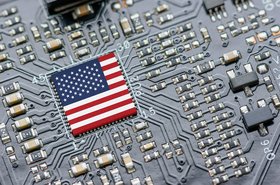US startup Substrate claims to have developed a chipmaking tool that can compete with the advanced lithography tools manufactured by Netherlands-based ASML.
The company also announced it raised $100 million in a funding round, which valued it at $1 billion. The round saw participation from Peter Thiel’s Founders Fund, General Catalyst, Allen & Co., Long Journey Ventures, Valor Equity Partners, and the CIA-backed not-for-profit firm In-Q-Tel.
In an interview with the Wall Street Journal, Substrate co-founder and CEO James Proud – described by the outlet as a “protégé of investor Peter Thiel” – explained that the startup’s tool uses x-ray light to etch microscopic patterns onto silicon wafers – the process known as lithography.
“Our light source begins with radio-frequency cavities accelerating pulses of electrons using powerful electric fields. The electrons ride each successive wave, gaining energy and increasing their velocity to near the speed of light,” Substrate says on its website.
“To produce light, these charged, highly energetic electrons traverse a gauntlet of strong alternating magnetic fields, which force them to release their energy as bursts of brilliant, intense light. These bright pulses of light are transported and shaped by a succession of perfectly polished optics all the way to the silicon wafer.”
Costing less to develop than ASML’s most advanced machines, which are priced at more than $350 million, Proud said the results demonstrated by Substrate are comparable to those produced by ASML’s technology, meaning the company could slash the costs associated with advanced lithography.
However, instead of supplying machines to chip manufacturers like ASML does, Proud said Substrate wants to establish its own network of semiconductor fabs that would be equipped with its own lithography machines. The company is aiming to be mass-producing chips by 2028 and reducing the cost of building fabs to “single-digit billions.”
At present, San Francisco-based Substrate has around 50 employees who have previously worked at companies including IBM, TSMC, Google, Applied Materials, and national laboratories.
Based in Eindhoven, the Netherlands, ASML is currently the sole global supplier of extreme ultraviolet lithography (EUV) photolithography machines, needed to make the most advanced 3nm and 5nm chips. The company has more than 40,000 workers.
Substrate is not the only group that has sought to challenge ASML by developing more cost-efficient or alternative approaches to lithography technology.
In August 2024, Japanese scientists published a simplified lithography method that used smaller EUV light sources and only required two mirrors instead of the traditional six, a technique that they claim consumes less than one-tenth the power of conventional EUV lithography machines.
That same year, Canon shipped its first nanoprint lithography machine to the Texas Institute for Electronics (TIE), touting the FPA-1200NZ2C tool as a low-cost alternative to ASML’s ultraviolet (EUV) and deep ultraviolet (DUV) photolithography technology. While the price of Canon’s machine was not made public, CEO Fujio Mitarai said the price would be “one digit less than ASML’s EUVs.”
Meanwhile, in the UK, the University of Southampton has opened the first electron-beam (e-beam) lithography facility in Europe. This technique uses a focused beam of electrons to create patterns in materials that are too small to fabricate with conventional photolithography.
Read the orginal article: https://www.datacenterdynamics.com/en/news/us-startup-substrate-raises-100m-for-development-of-lithography-tools-to-challenge-asml/









